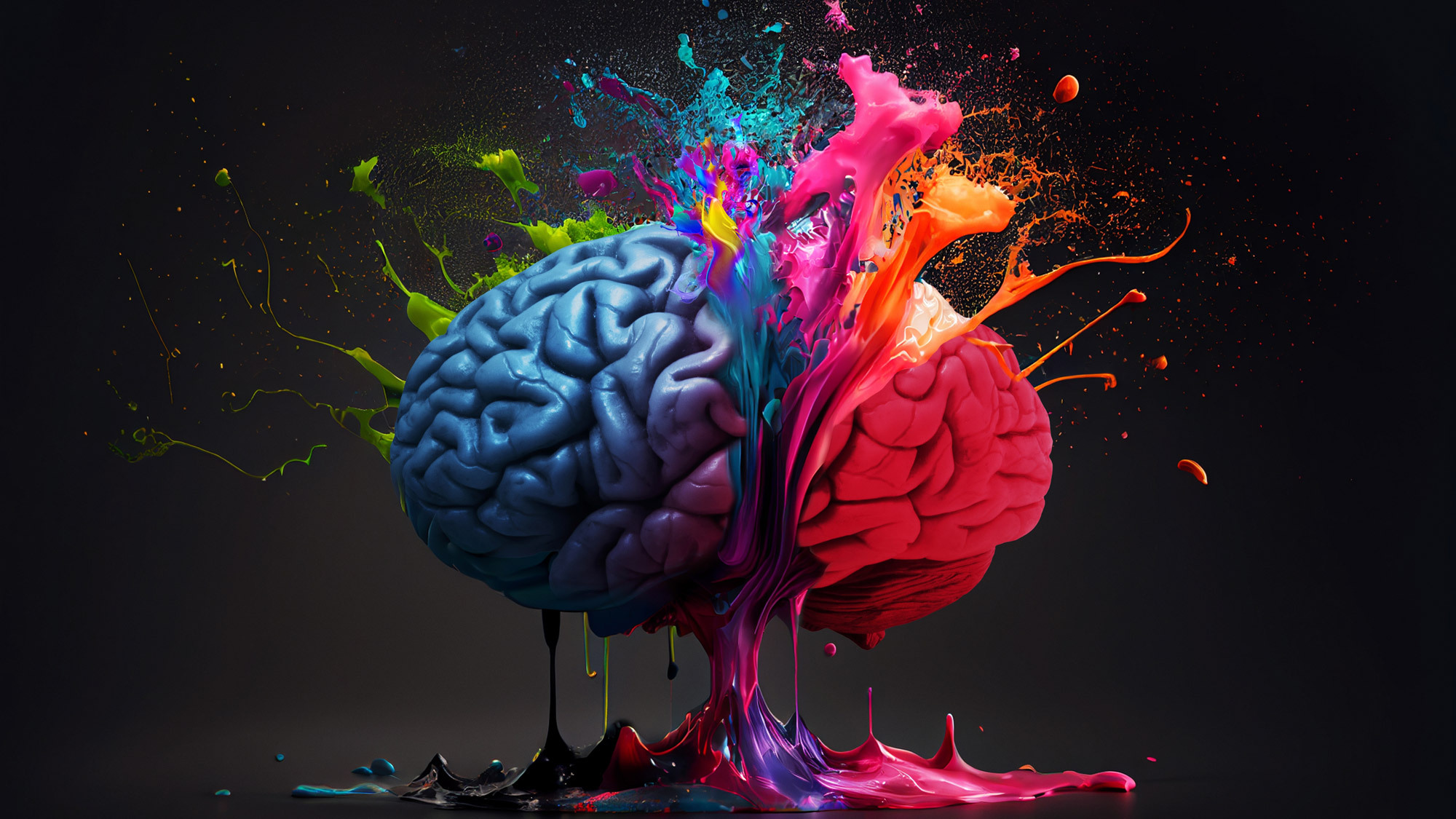I tested ChatGPT Search vs Google with 7 prompts — here’s the winner
Both chatbots are good teachers, but one is more like a professor.
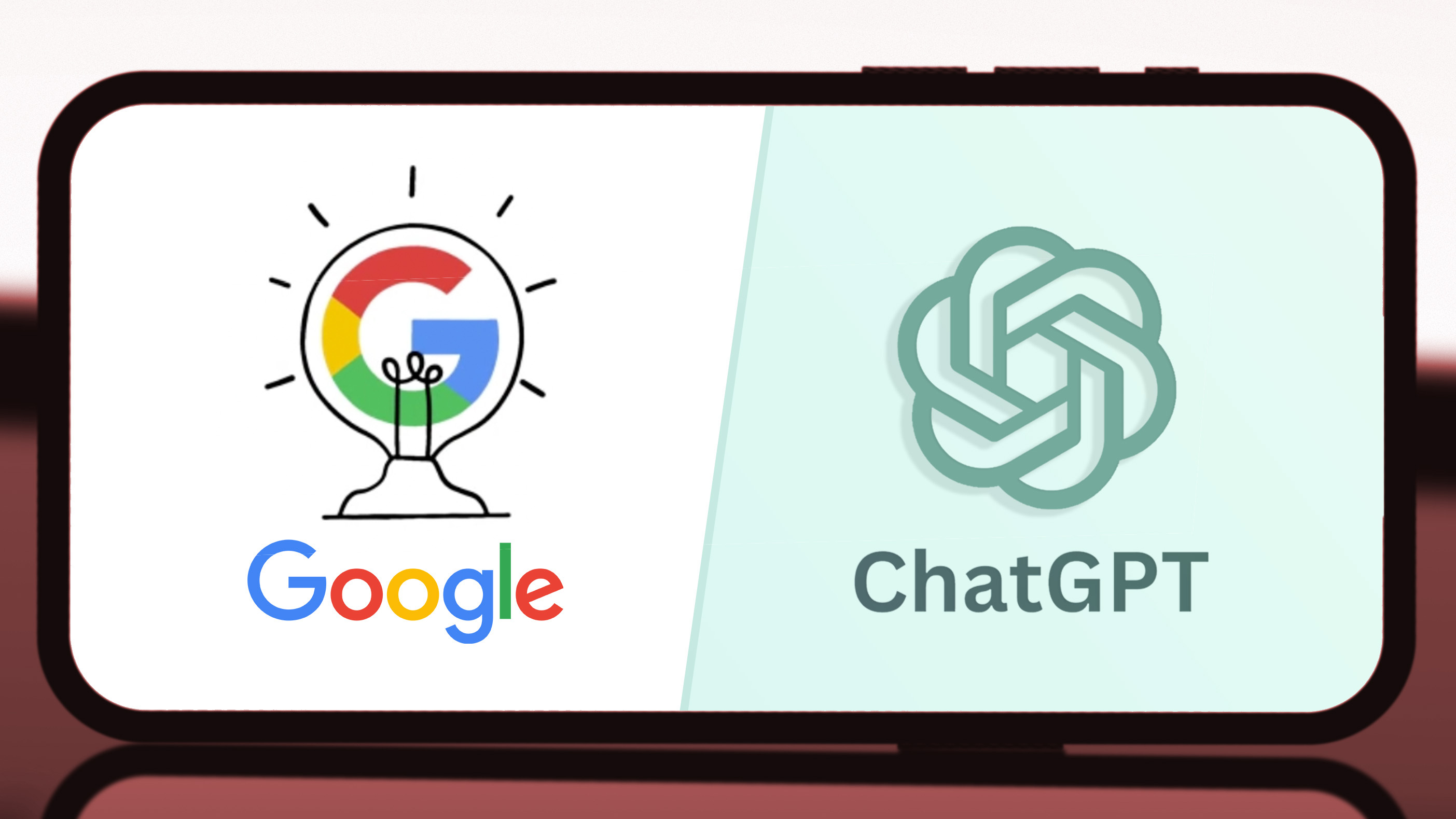
With so many AI learning tools, it can be hard to choose the right one as your go-to assistant for exploring new topics. That’s why I decided to put two of my favorites to the test. Google’s Learn About is a free tool built to encourage curiosity and inspire learning. The landing page has numerous topic suggestions for users to explore or users can enter their questions in a search box. The chatbot will also explain and summarize uploaded documents.
Similarly, ChatGPT Search aims to educate users with concise answers tailored to the user in a personalized response. Unlike Google’s Learn About, ChatGPT Search is not free and only available to Plus subscribers. Both chatbots are much different than a typical internet search because of the personalized and human-like response.
To find out how different and similar these chatbots really are, I tested seven prompts covering a mix of technical, creative, and practical learning needs. Here’s how each performed in this head-to-head showdown.
1. Simplification of STEM
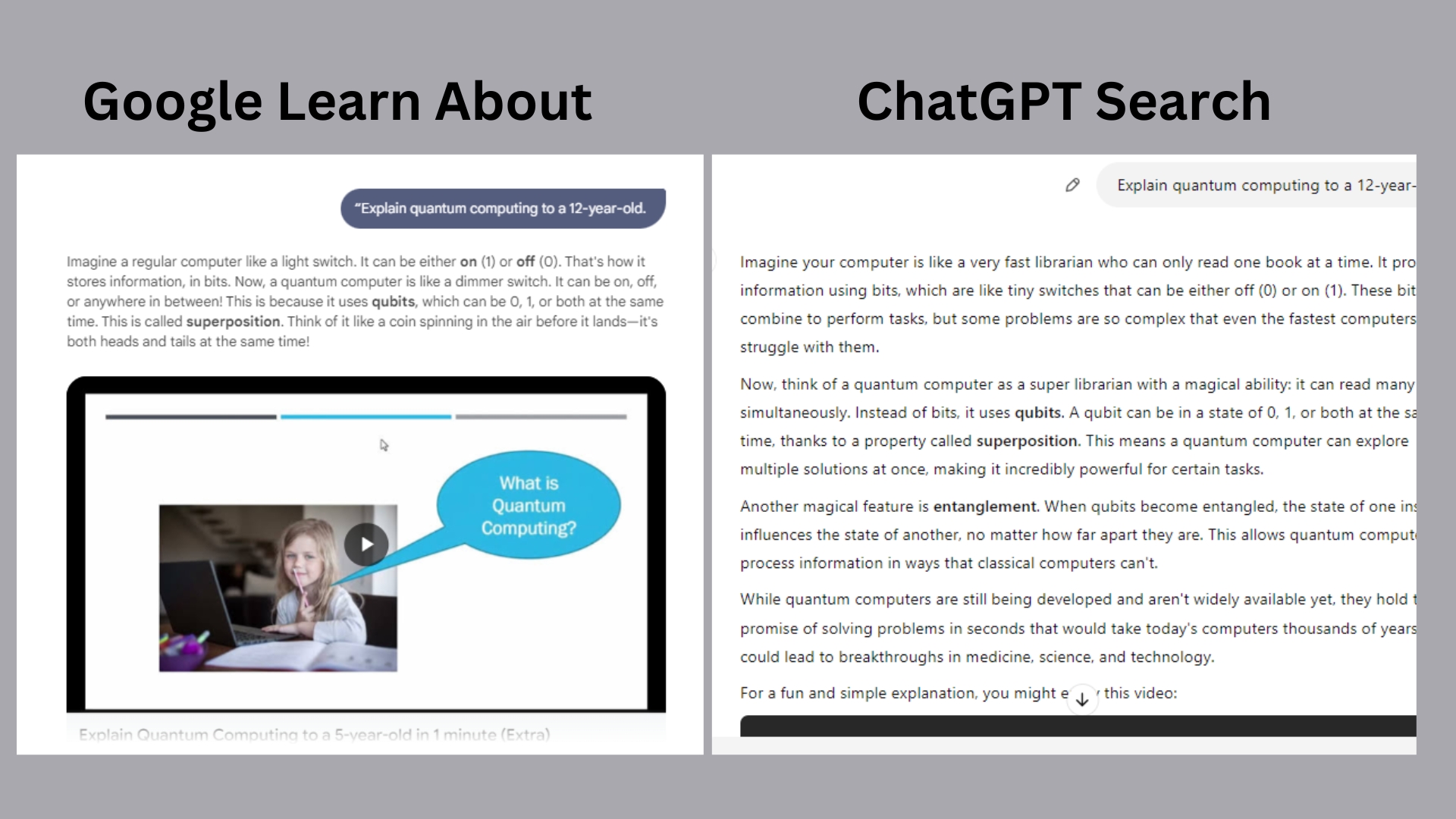
Prompt: “Explain quantum computing to a 12-year-old.”
Google Learn About provided a simple analogy, a sidebar of more ways to explore the topic, a quiz, and a video that I could watch without leaving the page. The response itself was helpful because it broke down quantum computing into bite-sized concepts that were easy to understand. The extra information in a neat sidebar offering to expand my research and explore the concepts further, was a major bonus. I also liked that I could access the corresponding video without leaving the chat.
ChatGPT Search offered a longer explanation that was more nuanced, still age-appropriate but offering a bit more substance. It introduced concepts like superposition and entanglement with creative, relatable examples while also suggesting resources for further exploration. There was a video accompanying this response as well, however it was unavailable directly within the chat and I had to click out of the conversation to watch it.
Winner: Google Learn About — more detailed and better for research because of the sidebar of more concepts to explore and the in-chat video.
2. Understanding differences
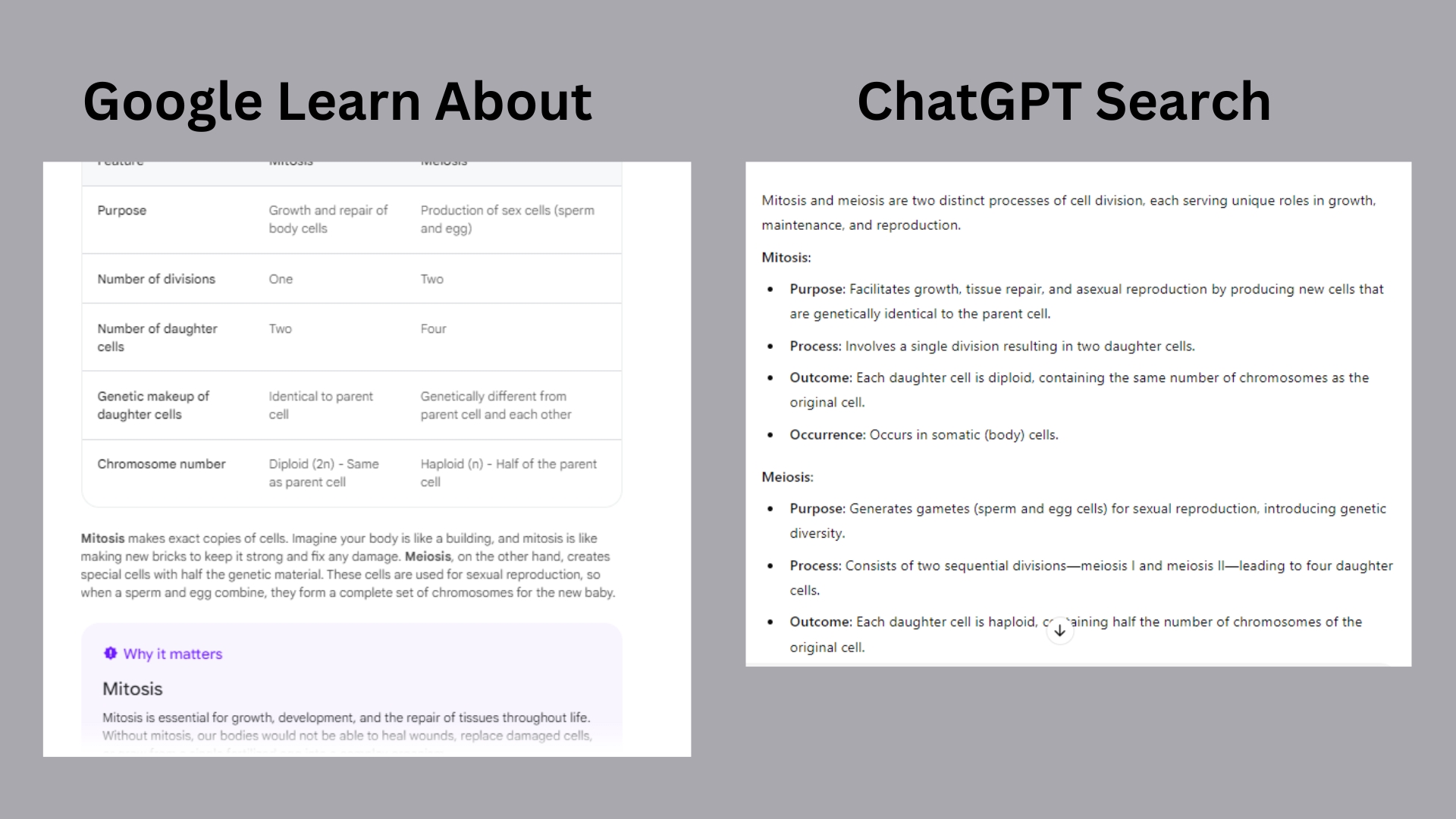
Prompt: "What’s the difference between mitosis and meiosis?"
Google Learn About offered a tabulated comparison between mitosis and meiosis, with a clear breakdown of stages, outcomes, and purposes. It even included a simple diagram, enhancing the visual appeal. Beyond that, it went on to share why the differences matter, including more ways to explore related content.
ChatGPT Search also provided a thorough comparison but leaned heavily on text-based explanations. While its descriptions were more narrative and conversational, it lacked the visuals and straightforward tabulation of Learn About.
Winner: Google Learn About — visuals and clarity take the lead plus, the encouragement from prompts made me want to dig further into the topic.
3. Art history
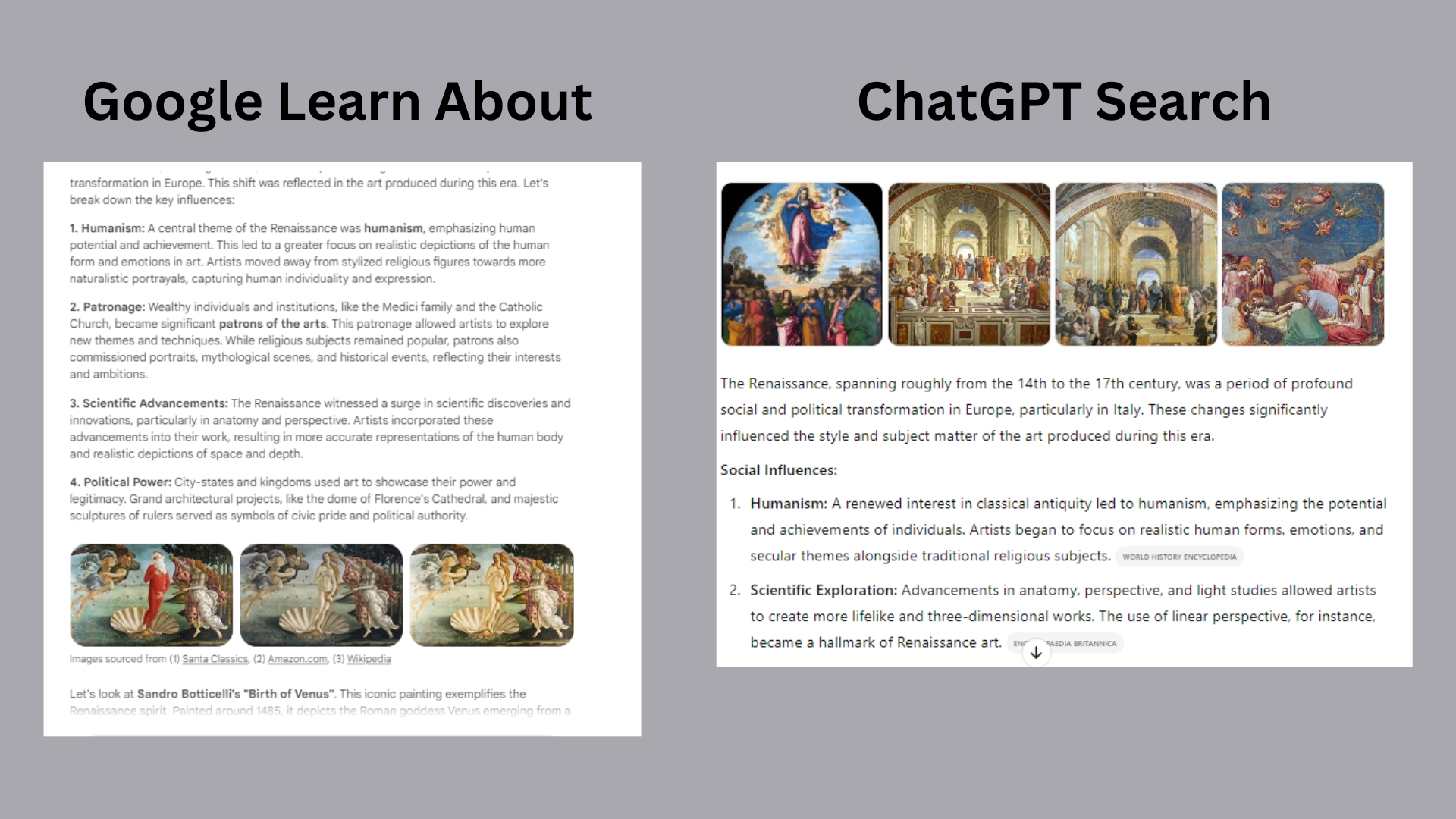
Prompt: “How did the social and political climate of the Renaissance period influence the style and subject matter of the art produced during that time, and can you analyze a specific artwork to demonstrate this connection?”
Google Learn About effortlessly unpacked everything in my prompt by generating a step-by-step look at the key influences of the Renaissance period— complete with images. In addition, it generated follow-up prompts for me to explore the topic further. It also recommended external links to gain further insight and expand my knowledge. This was a well-rounded response and offered even more than a simple answer.
ChatGPT Search crafted a personalized response, thoroughly answered the question, and included images. In a lot of ways, the chatbot answered the question similarly to Google Learn About. Yet, in terms of education, it missed the mark by not giving me more to explore. Although it included sources per usual, it did not give anything extra. ChatGPT Search typically gives the answer and nothing more.
Winner: Google Learn About — integrated resources and prompts to further educate made this a go-to teacher for art history.
4. Language skills
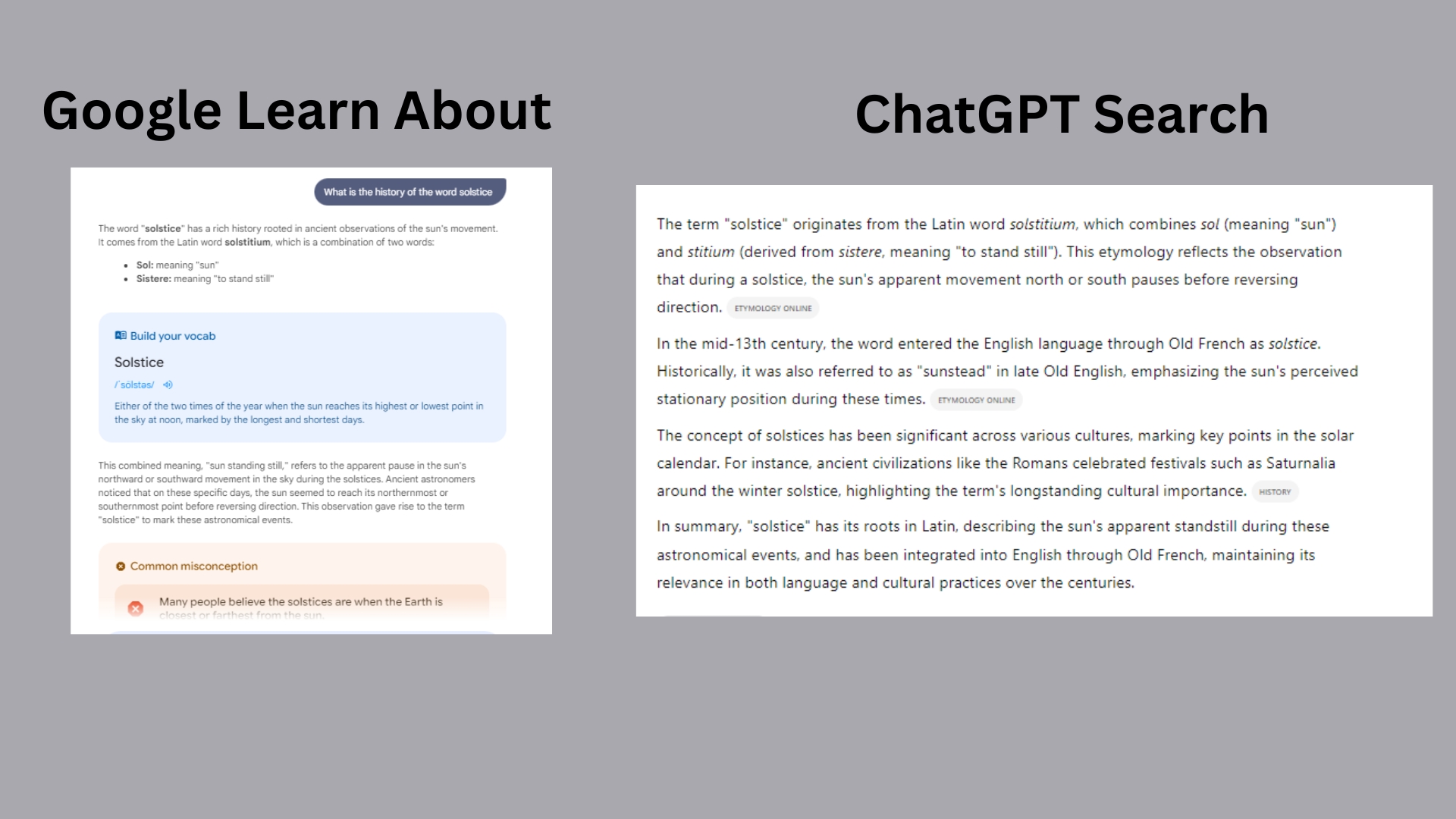
Prompt: “What is the history of the word solstice”
Google Learn About gave a much shorter response this time focusing on the word’s origin and breaking it down into two parts. From there it gave an option to explore the word further with the definition and opportunity to hear the word audibly. The chatbot included a common misconception about the word and further ways to explore, yet I didn’t feel as though the response was as thorough as possible.
ChatGPT Search went beyond with not only the Latin history of the word, but also when it entered the English language and more about how the word has been used throughout history. This response is more of what I was hoping for and it left me feeling as though my question was answered properly.
Winner: ChatGPT Search — the detailed, tailored and understandable information in this response made it the ultimate winner in this round.
5. Literature
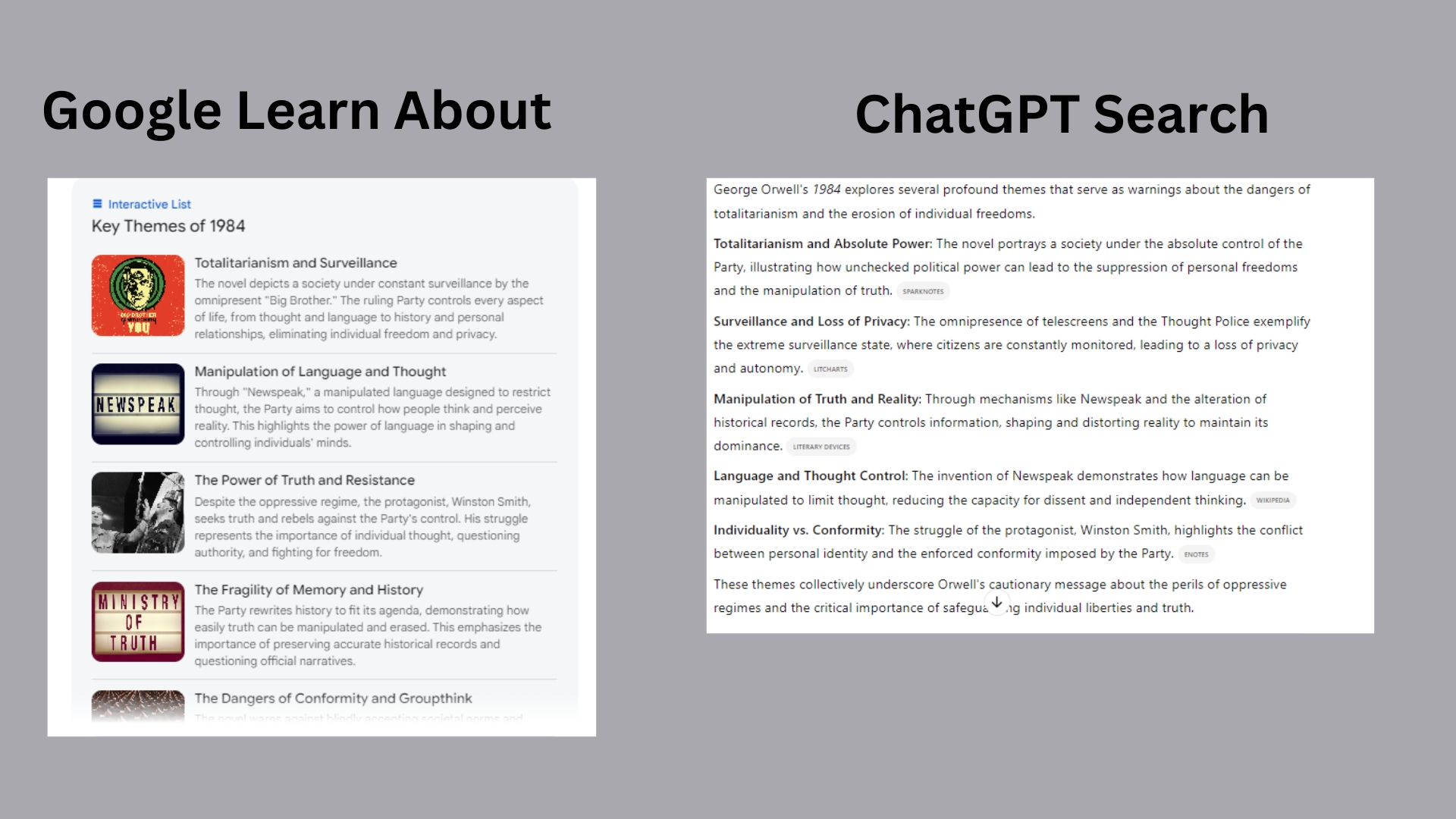
Prompt: “Summarize the key themes of 1984 by George Orwell”
Google Learn About delivered a succinct overview of themes like surveillance, totalitarianism, and the erosion of truth with clickable images to learn more. The external links to essays and study guides for deeper analysis, offered a nice study guide for anyone reading the book.
ChatGPT Search included a summary and was more conversational by providing examples from the book to illustrate each theme. However, it lacked the additional links to external resources that Google provided.
Winner: Google Learn About — the overview and extra opportunities to explore subtly encourage learning, which make this chatbot great for students who want to dive deeper.
6. Coding basics
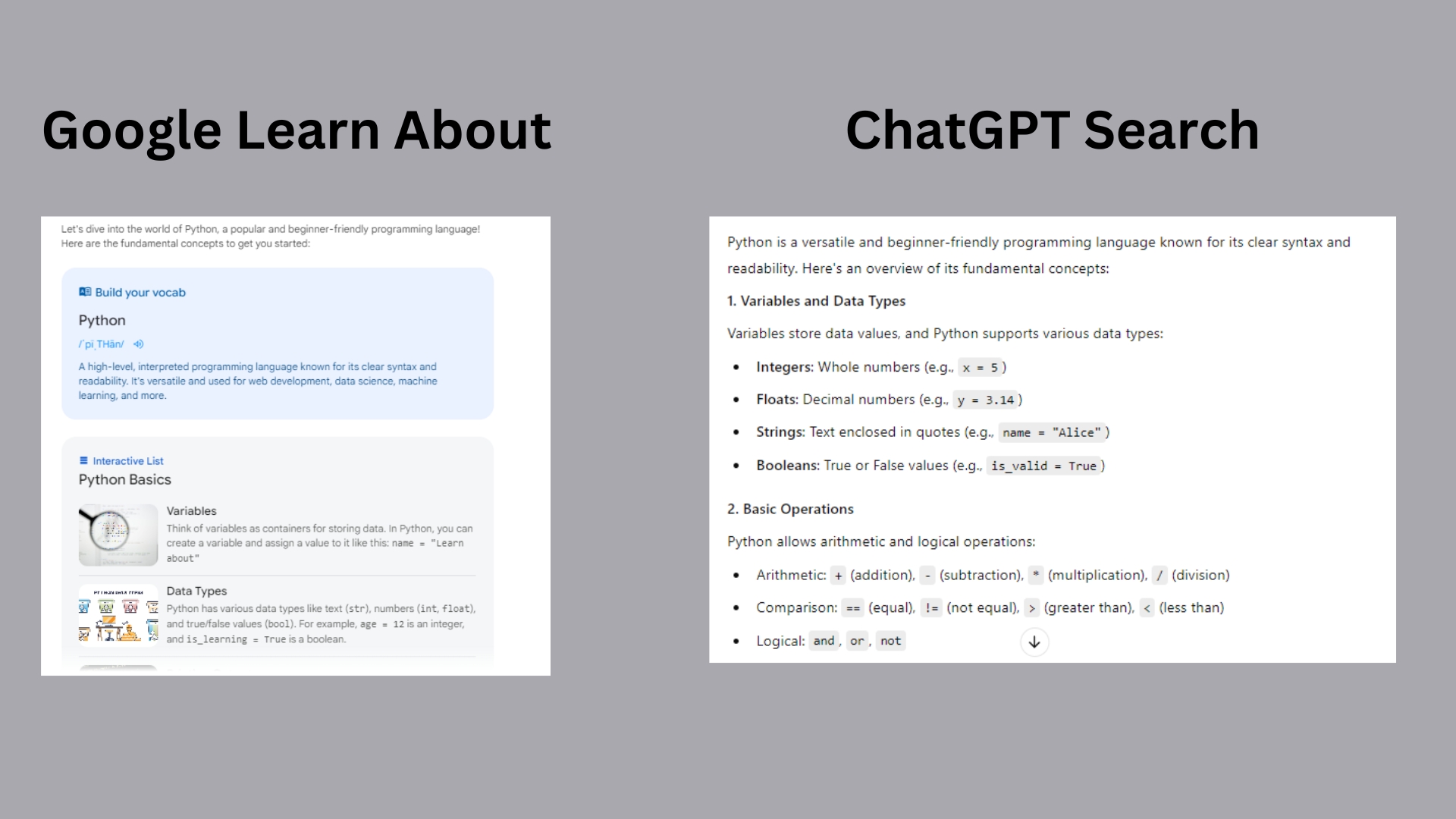
Prompt: "Explain the basics of coding in Python."
Google Learn About provided an excellent overview of Python, including its syntax and applications. It also included links to beginner tutorials, interactive coding exercises, and online Python editors for hands-on learning.
ChatGPT Search gave a much more basic response, which I appreciated as someone who doesn’t do a lot of coding. The chatbot responded in such a way that might be more appropriate for beginners. I felt that the knowledge I gained from the ChatGPT Search helped me understand the answer from Google Learn About. Both were good, but ChatGPT Search offered a more digestible response for someone completely new to the topic.
Winner: ChatGPT Search — the concise and conversational response on this topic gave it the edge this time.
7. Animal comparisons
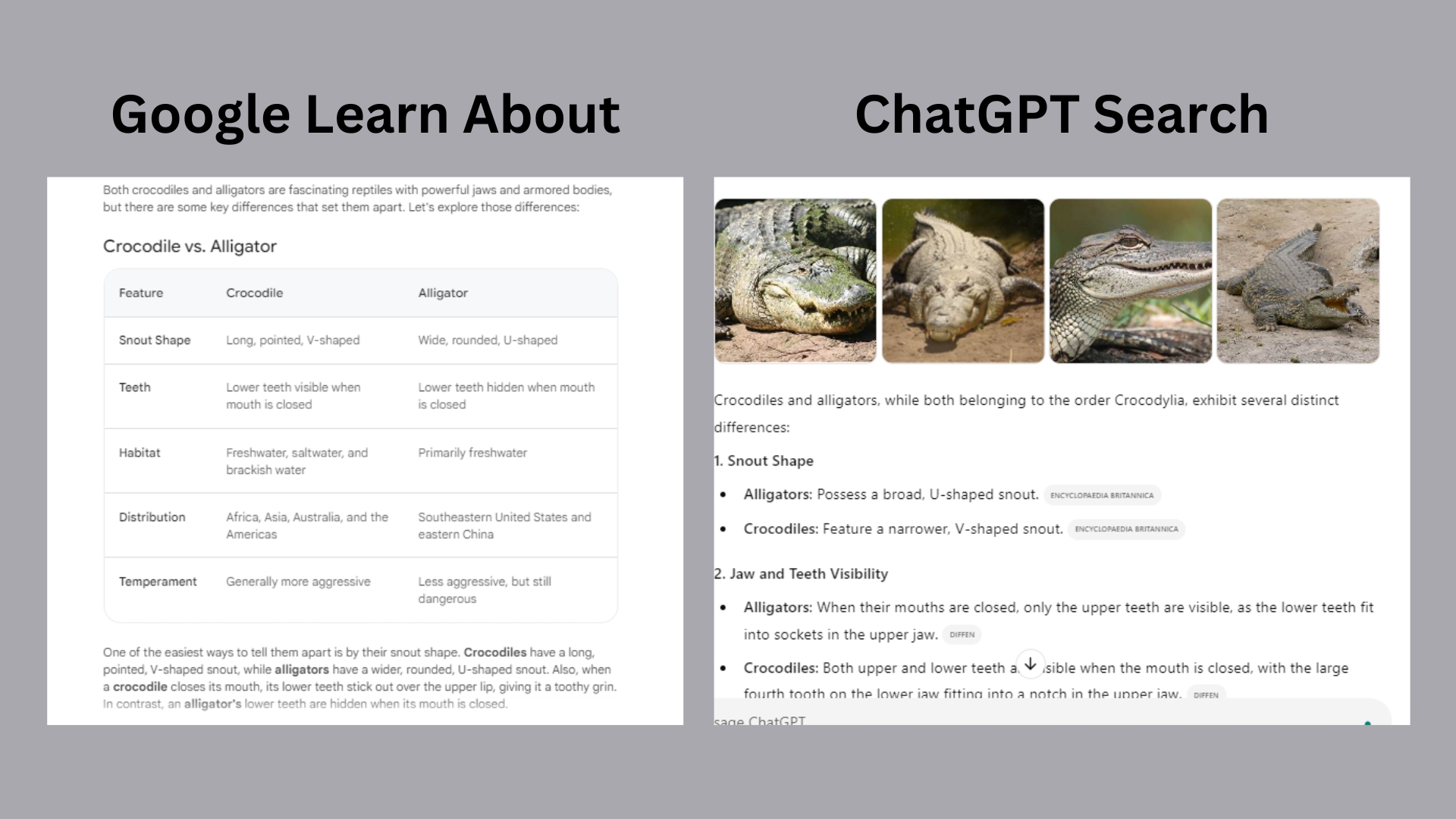
Prompt: “What’s the difference between a crocodile and an alligator?”
Google Learn About showed up for this answer ready to win. The chatbot responded with a chart displaying the differences between the two animals with images to accompany the response. The images were closeup to show differences in snout and teeth. It offered pre-written prompts to gather more research and included external links. The response was thorough and answered a question I’ve often wondered.
ChatGPT Search offered a detailed response that was concise but not at all conversational. The images did not feel as nuanced as Google Learn About and didn’t offer much information other than a visual of the animals. I liked the bullet points for each animal, but the response was not as efficient or useful as Google Learn About.
Winner: Google Learn About — richer insights and detailed images made all the difference, plus the chart was helpful and easy-to-read.
Overall Winner: Google Learn About
Both Learn About and ChatGPT Search excel as educational tools, but they shine in different areas. Google’s Learn About is perfect for fact-driven learners who appreciate visuals, concise summaries, and curated links to external resources. It’s particularly effective for academic and technical topics.
On the other hand, ChatGPT Search thrives in conversational depth and adaptability. Its ability to personalize responses and encourage deeper exploration makes it ideal for creative learning and nuanced topics.
Overall, for structured, resource-rich answers, Google’s Learn About is your best bet. It takes the crown for engaging, personalized learning with everything from thorough responses and further links to explore, as well as quizzes, information about misconceptions, and charts for grasping the information quickly. Plus, it's free, making it a learning tool for practically anyone with an internet connection and a spark of curiosity.
More from Tom's Guide
- I went shopping wearing the AI-powered Meta Ray-Bans
- I created 27 AI images of real-world landmarks — here's the results
- 7 Midjourney styles to bring new life to your AI images
Sign up to get the BEST of Tom's Guide direct to your inbox.
Get instant access to breaking news, the hottest reviews, great deals and helpful tips.

-
botato Claude is honestly better than both of them in my experience. My job has a guy that's going AI crazy so I've been able to get "Pro" versions of all 3. The code that executes within the chat is super cool tbh.Reply










